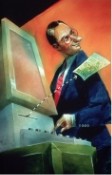Investor relations in an every more complex world
March 14, 2009
The basic function of investor relations is to deliver a service by a public company to its shareholders, and in doing so, it becomes a key contributor to the company's intrinsic and sustained value.
Today's management understand that the role of investor relations in the corporation is wider than HR, PR or accounting, in that its main objective is to grow shareholder value.
Core elements of the function combine a careful balance between required disclosure with proactive communications. In terms of the companies' act and exchange requirements, companies are oblidged to report on their financial wellbeing and growth by filing their financial results, as well as reporting on material developments that may impact on the companies' performance.
The IR officer participates in the preparing of these disclosures or filings. News releases will deal with material and non-material information in providing a holistic understanding of the company's position in the market, rising opportunities and threats.
The annual report also passes the IR officer's desk, as well as fact books and other promotional material. His day is spend answering requests for more information from the investment community, shareholders, management and the board.
Today a corporate website is indispensible, and the updating of content becomes part of the daily communications duties of the IR officer.
In addition, it is the IR officer who is responsible for the outreach to analysts and investors, arranging one-on-one and group meetings with prospective shareholders. Together with management or by himself, the IR officer goes out to communicate the latest developments at the company with its shareholder base.
He reports back to the board about their impressions of the company's strategies, business model and overall performance and notes any changes in attitudes or opinions.
An effective investor relations program contributes a significant percentage to a company's intrinsic value. The IR officer is part of the value creation team. Its impact is determined by the extend management is committed to investor relations, how effective the department goes about its task and the nature and size of the value proposition presented to investors.
IR is vital to help management understand the investment process and investor behaviour. The IRO has to keep his finger on the pulse about the macro factors driving the market, industry factors impacting on growth, and internal constraints or advantages that may change outcomes in the value creation process.
Througout his interaction with various investment groups, the IRO develops a deep understanding of the investment process, the investing style of each shareholder, their mandate, models and analysis and view of the company's prospects.
In supporting the value creation process, the IR officer has to identify the company's shareholders and analyse its common denominators. When he knows why people invested in the company, it is easier to supply their information needs. That would allow the analyst or shareholder to compare the drivers of their models with the actual deliverables from the company.
It also gives the IRO an idea as to whom would be interested in becoming shareholders in future. This enables management to better grasp the strategies, initiatives and drivers that the investment market deem important and will support.
This information is key to what determine the company's stock price and value. Understanding how the market values your company is the basis for your current stock price - whether it is under, over or fairly valued. It is the fundamental reason for is valuation in the market.
Investor relations heps management identify the drivers that determine company value. The goals is to have the market and management agree on core value drivers as a basis of comparing performance in future. IROs have the opportunity to lead the analysis and calculation of the company's intrinsic value, or worth of all its assets, not just cash flow and earnings.
These include physical assets such as plant, property and equipment, as well as intangible assets such as management skill, capability to develop new IP, its patents, licenses, competitive position in the market place and new products or services in the pipeline. It also include efficiencies in its plant or administration, its business partners, the level of creativity within the company and corporate leadership in society or environmental citizenship.
Intrinsic value is supported by sustainable revenue generation and growth, cash flows, sustainable and acceptable profit margins, with retained income availabe for reinvestment. Subtracting from instrinsic value are issues such as the introduction of new punative regulatory issues, environmental issues, lawsuits, declining markets, osolescence and new products or competition.
The IR officer needs to know where the company stands, comparing the company's current share price with its intrinsic value. Cash flow is the most fundamental economic measure, however, markets place significant weight on earnings. Where the market tends to focus change and on short term actions and gain in pushing the price higher, the company has to take cognisance of the needs of long-term investors. It has to focus on creating value over the longer term, and in this sense gives the IR function a basis to be effective.
In its communication to the market, the IRO has to make sure the focus falls on the facts. As investment conduit to the market, he has to understand the information requirements of the target audiences, assess market attitude and to communicate that to management in managing macro factors that pull the market in unpredicatable ways.
Posted by Suza Adam. Posted In : investor relations
 Suza Adam assists public companies to raise their profile, visibility and interactions online with the investment community and generate qualified investor leads for Investor Relations departments.
Her expertise in IR marketing will provide a significant boost and ongoing support to your Investor Relations program. Adam has a proven dedicated ability in corporate communications and marketing covering many aspects of public and private corporations.
Adam provides qualified investor leads so you can affordably communicate directly with stock market investors who have requested more information on your public company.
Suza Adam assists public companies to raise their profile, visibility and interactions online with the investment community and generate qualified investor leads for Investor Relations departments.
Her expertise in IR marketing will provide a significant boost and ongoing support to your Investor Relations program. Adam has a proven dedicated ability in corporate communications and marketing covering many aspects of public and private corporations.
Adam provides qualified investor leads so you can affordably communicate directly with stock market investors who have requested more information on your public company.